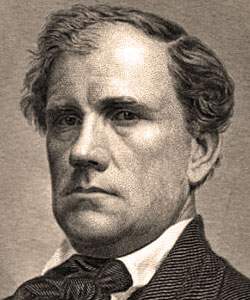John Wentworth (Congressional Biographical Directory)
Reference
WENTWORTH, John, (grandson of John Wentworth, Jr.), a Representative from Illinois; born in Sandwich, Carroll County, N.H., March 5, 1815; educated in the common schools and academies at Gilmanton, Wolfeboro, and New Hampton, N.H., and South Berwick, Maine; taught school for several years, and contributed political articles to newspapers; was graduated from Dartmouth College, Hanover, N.H., in 1836; moved to Chicago, Ill., in 1836, where he engaged as a clerk in a law office, and also studied law; editor and manager of the Chicago Democrat; appointed aide-de-camp to Governor Carlin in 1838; attended the law department of Harvard University in 1841; was admitted to the bar in 1841 and commenced practice in Chicago, Ill.; elected as a Democrat to the Twenty-eighth and to the three succeeding Congresses (March 4, 1843-March 3, 1851); elected to the Thirty-third Congress (March 4, 1853-March 3, 1855); Republican mayor of Chicago 1857-1863; delegate to the State constitutional convention in 1861; elected as a Republican to the Thirty-ninth Congress (March 4, 1865-March 3, 1867); resumed the practice of law; died in Chicago, Ill., October 16, 1888; interment in Rosehill Cemetery.
"Wentworth, John," Biographical Directory of the United States Congress, 1774 to Present, http://bioguide.congress.gov/scripts/biodisplay.pl?index=W000295.
John Wentworth (American National Biography)
Scholarship
"Long John" Wentworth, who stood 6' 6" and in his prime weighed more than 300 pounds, was the sort of colorful character that might have been created by a historical novelist seeking to portray a genial self-promoter who marched to his own drummer, yet retained the affections of the voters of Chicago and his northern Illinois district for three decades. A combative editorialist and debater who took forthright stands on the major issues of the day, Wentworth by the 1850s was a throwback to earlier times, representing a purer commitment to individual liberty and laissez faire capitalism than his businessmen enemies who thrived in the age of incorporation.
William G. Shade, "Wentworth, John," American National Biography Online, February 2000, http://www.anb.org/articles/04/04-01047.html.




